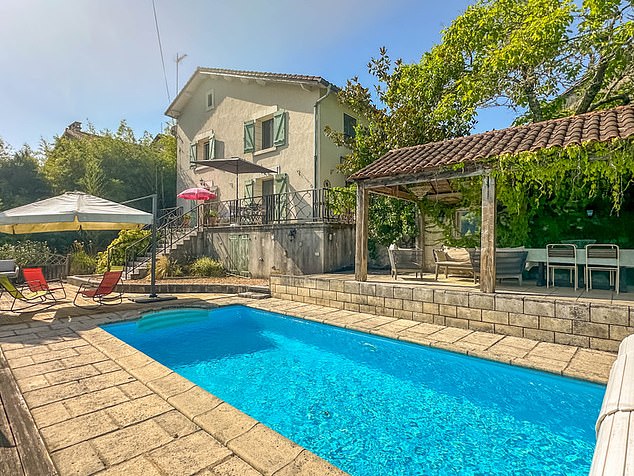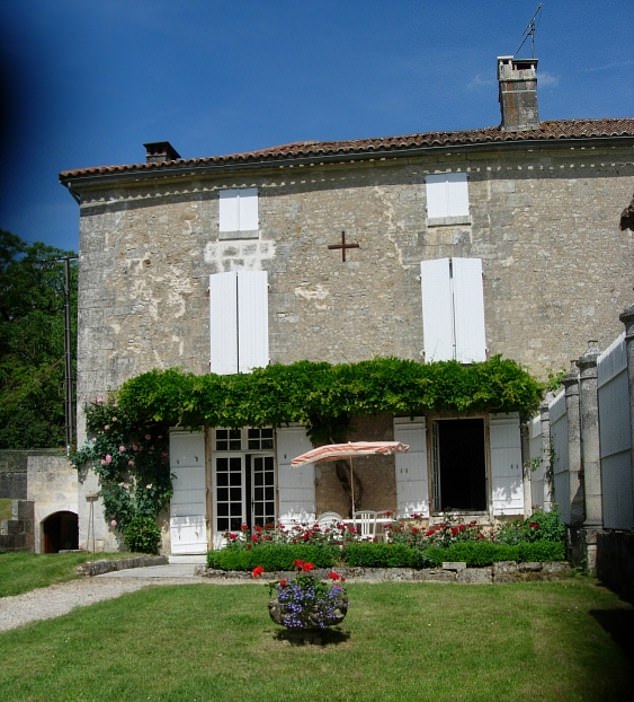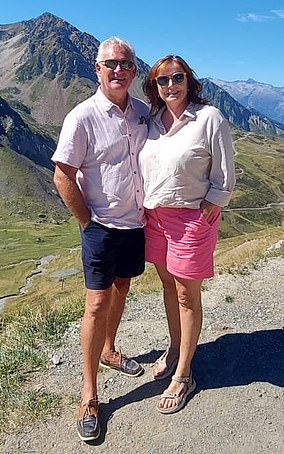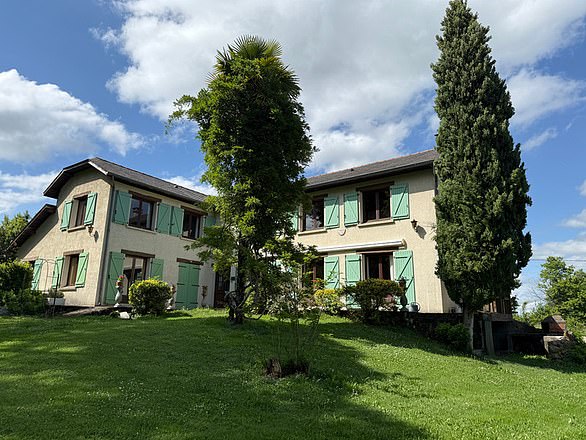After returning from a blissful holiday among the chocolate-box villages of the Dordogne or the beaches of Brittany, it’s easy to get drawn into the dream of owning a little French bolt hole.
Many a British holidaymaker has booked a property viewing having looked through French estate agents’ windows, marvelling at how much further your money goes.
Maybe a four-bedroom house in Normandy or the Lot-et-Garonne for just £100,000?
Or a two-bedroom apartment in a Pyrenees village for £93,000? You don’t need the hassle of a fixer-upper either – these are ready-to-go holiday homes.
Aside from the gastronomy, slower pace of life and more sunshine, France is so easy to reach from the UK – where else can you throw everything and the dog in the back of the car and just go?
There are about 86,000 British-owned holiday homes in France and thousands buy properties every year – mostly between €100,000 and €250,000 (£82,000 – £215,000).

Escape: This home in the Dordogne has 10 rooms and a swimming pool and is for sale through Leggett at £259,607
An estimated 150,000 Britons have made France their permanent home.
And that is despite the post-Brexit rule that means non-EU citizens can only stay in France and other EU countries for up to 90 days within any 180-day period for tourism or short-term visits.
But beyond those tantalising price tags, what are the true costs of ownership?
If you find yourself forking out hundreds of pounds to rent a French property a couple of times a year, would you really be better off buying one instead?
Buying the dream
Buying a home in France has always been about the lifestyle rather than making a quick buck.
Familiarity and a growing connection with a place motivate paying guests to become buyers, says Tim Swannie of estate agent Home Hunts.
‘The main reason is usually to have a physical base in an area that they love, rather than renting someone else’s home,’ he says. ‘They want a home that they can decorate and furnish and visit when they want.’
Emotional and family ties are often drivers, says Carol Curtis of Leggett Immobilier. ‘Some families have been holidaying in France for generations.’
Having a place to be enjoyed by their children and grandchildren is often the dream, but not always the reality.
Newly retired Welsh lawyer Rhian Gait-Parker and her husband Dave own a two-bedroom longere – a traditional, rural, rectangular home – in Bourbriac, Brittany, they bought for €80,000 (£69,000) in 2022.
They visit three or four times a year, finding it ideal because they visit with their dog who travels in a pet-friendly cabin on the cross-Channel ferry.
‘We didn’t invest too much in our little house as we also like to holiday elsewhere,’ says Rhian, 57, from Aberdare who says it costs a ‘modest’ £2,500 a year to run.
‘We have toyed with getting rid of it but when we just rent a place we don’t get the same sense of peace when you just turn up at your own home, where everything is familiar and easy. I liked working from home there too.’
Low house prices but also the low borrowing rates persuaded primary school teacher Graeme Powlesland to buy a four-bedroom home for €120,000 (£103,000) in 2015.
He’d grown to love Normandy’s Cotentin Peninsula after regularly staying in a house owned by a relative.
‘My long-term plan was to boost my pension with a house in the UK, but when I found out I could get a 20-year fixed French mortgage, it was a no- brainer,’ says Graeme, 52, from Little Chesterford in Essex.
He’s renovated the annexe into a two-bedroom gite, which he has just started renting out for €115 (£99) a night with traum-ferienwohnungen, and hopes the income will cover 50 per cent of his running costs. ‘I transfer €1,000 (£862) a month to cover essential bills. Taxes are €800 (£690) a year.’
But he calls his French home his lifetime project. ‘I love sharing it with as many family and friends as possible,’ he adds.
Few people will see double-digit price growth on their French home unless they’ve owned it for several years.
The average property price in France fell by 4.2 per cent in 2024, report the Notaires de France (public legal officials).
Yet buyers like Graeme view French property as a safe long-term investment – or even as a Euro-based asset that can hedge against currency fluctuations.
Weigh up your costs
A charming three-bedroom villa with a pool in the Dordogne might cost £2,000-£3,000 a week, according to travel agent Oliver’s Travels.
But if you rented one for six weeks a year for a decade, at a cost of £150,000 that is only around 50-60 per cent of the cost of buying one.
Leggett is selling one in the pretty town of Brantome for £258,498 while there’s one in Sarlat for £232,000 through Green-Acres.fr.
But there’s more than the price tag to budget for.
Once you’ve factored in the cost of viewing trips across the Channel, buying costs are higher than in the UK, at about 10 per cent of the purchase price, says Judith Whitlow of Beaux Villages – Savills’ French associate.
‘Allow 8 to 9 per cent of the purchase price for Notaire fees for older properties, plus additional costs might include surveys, currency exchange, and legal advice,’ she says.
Notaire fees (a notaire officiates a French property sale) include transfer taxes, land registry fees and admin costs.
Annual charges
There is also the cost of ownership. Annual property taxes include Taxe foncière, a yearly ownership tax (which varies significantly by location and property value) and Taxe d’habitation, a tax for second homes.
The average amount charged for Taxe d’habitation is about €1,000 (£862) per year, says Savills.
Ms Whitlow points to a four-bedroom house in the Dordogne for sale at €300,000 (£258,000) with a taxe fonciere of €1,031 (£889) a year.
On a four-bedroom property selling for the same sum in the Aude, the same tax is €2,016 (£1,739).
Major expenses every 15-20 years may include roof maintenance, swimming pool renovation, new heat pump and indoor heating system replacement, which can all top five figures.
Sue and Tony Bridges from Suffolk bought a holiday home in Carcassonne, southwest France, and underestimated running costs.
The couple bought a two-bedroom property for £120,000 in 2023 and Sue, 59, says they spend €5,195 (£4,482) a year.
Other annual costs include €205 (£176) house insurance, €516 (£444) internet, €324 (£279) water, €1,741 (£1,497) taxe fonciere, €800 (£688) taxe d’Habitation and €1,360 (£1,170) on building maintenance. Then there is the electricity bill, mobile phone costs and bank charges.
‘We spend six weeks there every summer for the music festival – in total 14-16 weeks a year,’ says Sue, who withdrew a lump sum from her pension to fund the purchase. ‘We love every moment.
‘I would like to be out there more, but we like going to other places too. We do not rent it out in case of damage,’ she adds.
Not having a swimming pool cuts down on running costs, yet being able to afford a large garden is one of the key attractions of a rural French property.
Allow €25 – €40 (£22 – £34) per hour for gardening. So two hours a week over 30–35 weeks will add up to €1,200 – €2,800 (£1,032 – £2,408) a year, according to Charles Cramailh of Leggett Property Management.
If you have a swimming pool that is fully managed for you this will add €1,100 – €3,000 (£946 – £2,580) a year.
Plus if you really need someone local to keep an eye on the property for you, keyholding or regular checks can add €1,300–€3,000 (£1,118 – £2,580) a year.
For odd jobs and maintenance at €20 – €50 (£17 – £43) per hour; owners typically spend €300 – €1,000 (£258 – £860) a year.
Mr Cramailh says a typical three-four-bedroom detached house in a village of the Occitanie region of southwest France, with a pool and medium-sized garden, costs €6,500 to €12,200 (£5,590 – £10,492) a year to run, including utilities but excluding second-home tax.
There’s also home insurance at €300 – €600 (£258 – £516) a year – higher than for main residences.
He says that Occitanie is on the high side; premiums this year rose by 8-12 per cent on 2024, and this summer’s forest fires will likely push them up further.
‘Bills you can budget for, but the surprise for many home owners is the constant trickle of seasonal, local and unexpected expenses,’ he says.
‘Insurance jumps after a bad storm season, local taxes can be re-assessed or surcharged overnight, and property needs regular attention when it sits empty.’

Rental income: This home is available to rent from £700-£1,300 a week in Brantome, in the south west of France
Renting it out
More second-home owners are looking to rent out, even for short periods, to offset rising costs.
For those who rent out short term, a full-management company will generally charge 15–30 per cent of rental income (plus cleaning), then there is rental income tax to pay on profits.
Dealing with changing tax rates or rules for holiday-let owners usually incurs accountancy fees.
Deciding to sell
If you sell, you’ll pay some capital gains tax.
There are two types of capital gains tax – 19 per cent income tax and 7.5 per cent social charges (Britons get a reduced rate compared to other non-EU nationals) but by offsetting costs, the amount to be paid can be reduced considerably, says tax advisor Geraud Nayral of French Connections HCB.
The stamp duty paid on the property, estate agent fees and also 15 per cent renovation costs paid out can all be deducted, and there’s also taper relief – depending on how many years you have owned it.
So if you made a €100,000 (£86,000) gain on a €300,000 (£258,000) property over ten years you’d end up paying only €5,681 tax on that gain, according to Mr Nayral.
Those with real estate assets in France over €1.3million may need to pay wealth tax (IFI).
If that all sounds rather off-putting then the answer is to keep on renting.















